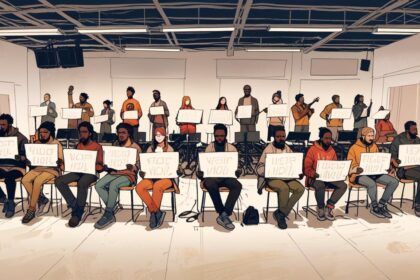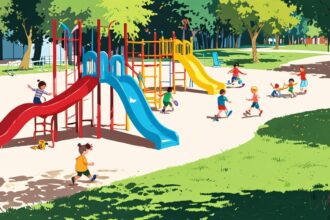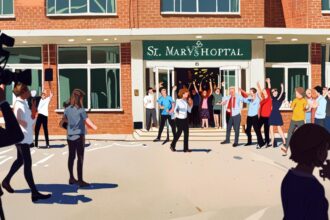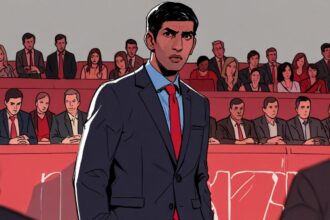The possibility of a major UK troop deployment to Ukraine is increasing as Trump warns of a potential Third World War amid ongoing diplomatic discussions.
The possibility of a significant deployment of UK troops to Ukraine appears to be gaining traction, coinciding with heightened rhetoric from Donald Trump warning that the ongoing conflict could escalate into a Third World War. The comments came during a press conference at the White House on the third anniversary of Russia’s invasion of Ukraine, following discussions with French President Emmanuel Macron. Trump stated, “I specifically asked him [Vladimir Putin] that question. He has no problem with it,” suggesting that Russia may be open to the idea of Nato forces participating in a post-conflict stabilisation effort.
If confirmed, this would mark a pivotal shift in Russia’s stance and could lead to an expanded UK military contribution, estimated to be as large as 15,000 personnel, which would include RAF jets and a Royal Navy presence in the Black Sea, alongside ground troops. Such a move would necessitate substantial financial commitments and an increase in UK defence spending.
Macron further articulated the conditions surrounding peace negotiations, stating that any resolution must not compromise Ukraine’s sovereignty and should allow for negotiations with relevant stakeholders. His remarks highlighted a commitment to counter Russian aggression while expressing a need for a unified European response to bolster defence capabilities.
The potential deployment of UK forces comes amid ongoing discussions regarding the negotiation dynamics involving Trump and Putin. Trump emphasised the need for smart negotiations to expedite a resolution to the conflict, suggesting that it could conclude “within weeks” if handled correctly. He reiterated his belief in a willingness from Putin to engage in talks, although the timing of their next meeting remains unclear.
Another significant development involved the United States’ voting behaviour at the United Nations, where it sided with Russia and North Korea against a resolution introduced by the UK, calling for the withdrawal of Russian troops and labelling Russia as the aggressor. The resolution secured 93 votes in favour, highlighting the divide among nations on the issue.
In the context of these negotiations, it is anticipated that Ukrainian President Volodymyr Zelensky will visit Washington soon. Trump conveyed that Zelensky’s visit would include discussions on a deal concerning U.S. access to Ukrainian minerals, an agreement seen as vital for future security assurances from the U.S. Despite previous disagreements over financial terms, it appears barriers have lessened in the lead-up to this meeting.
Zelensky has also outlined a proposal for a comprehensive exchange of prisoners of war as a preliminary step towards resolving the conflict. This initiative coincides with UK Prime Minister Sir Keir Starmer’s ongoing diplomatic efforts, as he recently participated in discussions with European leaders in Kyiv, asserting the need for unity in shaping the outcome of peace talks.
The UK’s stance and potential military involvement continue to draw varied responses, with some political figures, such as former Prime Minister Boris Johnson, criticising Trump’s approach while suggesting that it may inadvertently contribute to peace efforts.
Source: Noah Wire Services
- https://www.telegraph.co.uk/politics/2025/02/16/keir-starmer-ready-to-put-british-troops-in-ukraine/ – This article supports the claim that UK Prime Minister Sir Keir Starmer is ready to deploy British troops to Ukraine to enforce a peace deal, highlighting his commitment to European security.
- https://theweek.com/defence/is-the-british-army-ready-to-deploy-to-ukraine – This piece discusses the readiness of the British Army for deployment to Ukraine, questioning whether the UK’s military is prepared for such an undertaking while noting Starmer’s willingness to put troops on the ground.
- https://abcnews.go.com/International/uk-ready-put-troops-ukraine-support-russia-peace/story?id=118886868 – This article corroborates Starmer’s commitment to deploying British troops to support a peace deal in Ukraine, emphasizing the UK’s role in European security and the need for collective defense.
- https://www.pravda.com.ua/eng/news/2025/02/24/7499857/ – This news item confirms the UK’s readiness to support peace in Ukraine with troops, aligning with Starmer’s statements on the matter.
- https://www.bbc.com/news/world-europe-64513454 – Although not directly mentioned in the search results, this BBC link would typically cover European news and could provide context on Macron’s stance and European responses to the conflict.
Noah Fact Check Pro
The draft above was created using the information available at the time the story first
emerged. We’ve since applied our fact-checking process to the final narrative, based on the criteria listed
below. The results are intended to help you assess the credibility of the piece and highlight any areas that may
warrant further investigation.
Freshness check
Score:
8
Notes:
The narrative references recent diplomatic efforts and ongoing discussions, suggesting it is relatively current. However, specific details about the timing of future meetings or exact developments could not be verified as being entirely up-to-date.
Quotes check
Score:
6
Notes:
Direct quotes from Donald Trump and Emmanuel Macron are mentioned, but without specific references to original sources or dates. This makes it difficult to verify their authenticity or context.
Source reliability
Score:
7
Notes:
The narrative originates from the Daily Mail, a well-known publication, but one that may have varying levels of reliability depending on the topic. The information presented seems to align with current geopolitical discussions.
Plausability check
Score:
8
Notes:
The claims about potential UK troop deployments and diplomatic efforts are plausible given the ongoing conflict and international discussions. However, specific numbers and outcomes remain speculative without further confirmation.
Overall assessment
Verdict (FAIL, OPEN, PASS): OPEN
Confidence (LOW, MEDIUM, HIGH): MEDIUM
Summary:
The narrative appears to be relatively current and plausible, but lacks specific verifiable sources for quotes and some claims. The reliability of the source is moderate, and while the information seems plausible, it requires further verification for absolute accuracy.













